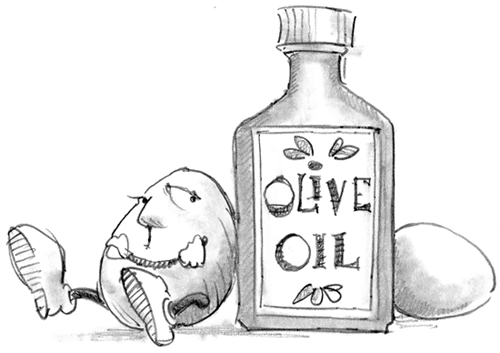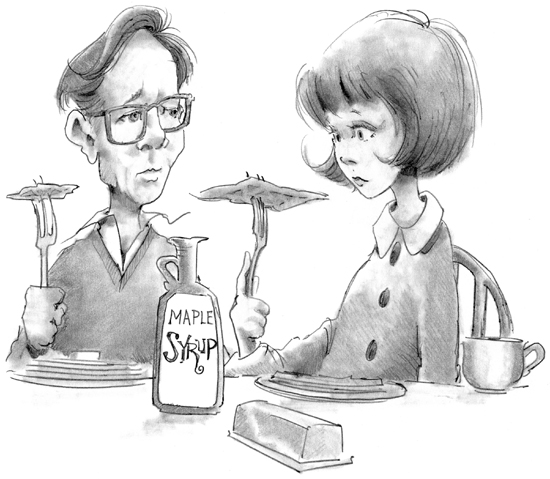

“Let me explain to you how mayonnaise works. Have you ever heard of a colloid?”
Aretha’s dad, Mr. Timmons, stood at the kitchen counter with a food processor in front of him. Aretha, Ben, and I were sitting on tall kitchen stools on the other side of the counter. We were taking notes in our notebooks, and Ben was filming. “I don’t want to miss any important information,” he’d explained when he showed up at Aretha’s with his camera. “Plus, who knows? Maybe we could end up doing our own cooking show. ‘Aretha’s Dad Teaches Kids to Cook,’ or something like that.”
“I don’t know about a colloid,” Ben said now. “But I’ve heard of a collard. Is that the same thing?”
Mr. Timmons laughed. “Not quite. You make a colloid when you dissolve one thing into another thing. When we’re talking about liquids, it’s more accurately called an emulsion.”
Aretha and I both wrote like crazy in our notebooks. Ben popped off his chair so he could move in for a close-up.
Holding up an egg and a bottle of olive oil, Mr. Timmons said, “The interesting thing about mayonnaise is, here you have two things that don’t typically mix. You’ve got your oil, and in this egg you have water. But because we’re going to slowly dissolve the oil into the eggs, we’re going to bring these two opposites together.”
Then he broke three eggs into the food processor and punched the on button. Once the eggs were all mixed up, he started dripping olive oil into the feed tube on top.
“You have to be patient,” Mr. Timmons told us. “Just a little bit of oil at a time.”
It seemed like it took forever, but all of a sudden the stuff in the food processor turned all creamy and white.

“Cool!” Ben exclaimed, recording the mayo from all angles. “There’s only one problem.”
“What’s that?” Mr. Timmons asked.
“Mayonnaise sort of makes me feel sick.”
Mr. Timmons nodded. “Me too, but I know you guys are interested in science, and this is the most food science I know. So who wants to learn how to make hamburgers for lunch?”
We’d already made scrambled eggs, hard-boiled eggs, omelets, and egg salad (which was when Mr. Timmons decided he should to teach us how to make mayonnaise). To be honest, I was getting a little tired of eggs. Hamburgers sounded great.
After Mr. Timmons gave us all his best hamburger cooking tips (don’t overhandle the meat, fry the burgers in butter, don’t turn up the heat too high), and we had four burgers frying in a pan, Aretha said she thought we should have salad with our burgers in order to keep our meal nutritionally balanced. “One thing I’m supposed to do for my badge is make a meal healthier,” she told us. “Adding a salad in this situation will definitely do the trick.”
Mr. Timmons gave Aretha the thumbs-up. “Salad dressing is the easiest thing in the world,” he said, handing me the olive oil and a bottle of balsamic vinegar. “Two parts oil to one part vinegar, and you’ve got salad dressing. All you’ve got to do is put it in a jar, put the lid on, shake the jar up, and there you have it—your very own colloid!”
“But since it’s liquid, we call it an emulsion,” Aretha said, writing in her notebook. “Right?”
“You got it, my little genius,” Mr. Timmons said. “Now who wants to peel some carrots?”
After we finished eating lunch, me, Ben, and Aretha cleaned up the kitchen and tried to brainstorm egg recipes, but it turned out everybody was sick of eggs.
“How about an omelet with bacon and raspberries?” Ben asked as we were getting ready to leave. “Or a BLT omelet?”
“I don’t think you can cook lettuce,” Aretha told him. “It gets all slimy.”
“You could use spinach instead of lettuce,” I suggested. “People eat slimy spinach all the time. I mean, you know, the cooked stuff.”
Of course, at our house, you’ll find most of the slimy spinach in a bag at the bottom of the vegetable bin in the fridge.
That, you want to avoid.
When I got home, I decided to study my lab notes from my week of kitchen duty. Since I’d started cooking dinner, I’d learned a lot of stuff. First, there were all the lessons I learned about making spaghetti the first night. The next day, when I made the brownies for Evan, I learned about the importance of cleaning up as you go, or else you won’t actually have time to make dinner. Last night, when I’d finally gotten around to trying homemade waffles, I learned that a tablespoon is not a spoon you’ll find on a table, but an actual measuring spoon that’s with all the other measuring spoons in the kitchen drawer.
Which might explain why my waffles came out sort of flat.
“Kind of like tortillas,” Lyle had observed when I served them up. “Except with syrup.”
It was my mom who figured out I’d used a cereal spoon to measure out the baking powder. “That would give you about a teaspoon of baking powder,” she explained. “And the recipe called for a tablespoon, so three times as much. Baking powder is a leavening agent. Do you know what that means?”
“Leavening agent?” I asked. My mom raised her eyebrows—the universal signal in our house for “look it up.”
So I looked it up. A leavening agent is what makes stuff puff up by producing carbon dioxide. I already knew about yeast, but it turns out that baking powder and baking soda are leavening agents too. Without them, cookies, waffles, bread, and cake would all fall flat.
Lesson learned.
Reading my lab notes, I felt like I’d had a pretty good week, even if I hadn’t made anything explode yet. I knew deep down that exploded food probably wouldn’t taste all that good, but I bet it was the funnest food to cook.
So if my week had been so scientifically successful, why did I have a bad feeling in the pit of my stomach?
Two words: Evan Forbes.

I’d made two batches of brownies already for Evan, and next week he wanted me to make him three. “I’m selling some of them to my buddies,” he explained. “Fifty cents a pop. I’m raking in the dough, Mac.”
To be honest, that didn’t seem very fair to me. I was doing all the work. Why should Evan be making all the money?
Unfortunately, I didn’t have the guts to ask him.
One thing I knew for sure was that Sarah was going to start getting suspicious if I made brownies nearly every afternoon. And if Sarah got suspicious, she’d start nosing around and figure out that Evan Forbes was a brownies bully. Then she’d tell my mom, and my mom would call Principal Patino, and Principal Patino would call Evan into the office, and then after school Evan would clobber me.
I needed a plan.
Fortunately, I was a scientific genius, so it only took me eight hours to come up with one. I was brushing my teeth, and I was thinking about what I was going to do the next day. Ben wanted me to go over to his apartment so we could work on our prizewinning recipe. He still didn’t know what he wanted to make, and we needed to decide fast.
I thought about what Aretha said. Make something you like, but make it a little bit different. Give it a new twist.
Well, I liked brownies, or at least I used to like brownies before Evan Forbes started forcing me to bake them.
So why not work on a fantastizoid brownie recipe? That would give me just the excuse I needed for making a ton of brownies. I could make fifty brownies a day and start stockpiling them in the freezer. By the end of the week, I might have enough brownies to give Evan for the rest of the year.